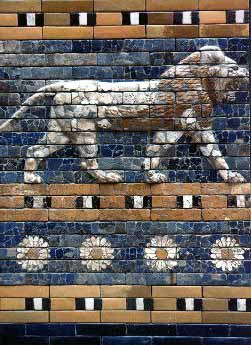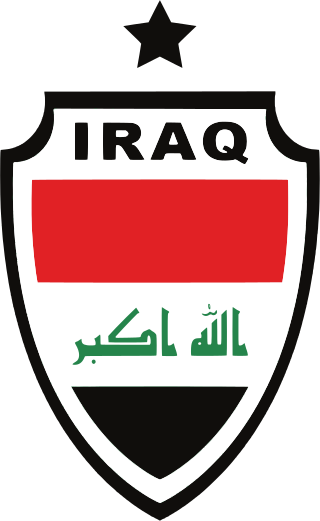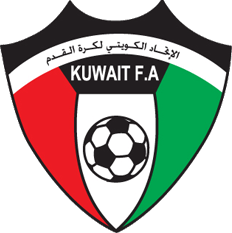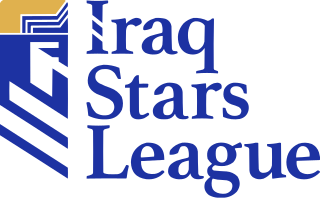Career statistics
International goals
Scores and results list Iraq's goal tally first.
| No | Date | Venue | Opponent | Score | Result | Competition |
|---|---|---|---|---|---|---|
| 1. | 13 December 1971 | National Stadium, Kuwait City | 5–0 | 5–0 | 1972 AFC Asian Cup qualification |
| Personal information | |||
|---|---|---|---|
| Full name | Sattar Khalaf | ||
| Date of birth | 1 July 1946 | ||
| Place of birth | Iraq | ||
| Position(s) | Goalkeeper | ||
| Senior career* | |||
| Years | Team | Apps | (Gls) |
| Al-Sikak | |||
| Al Shorta | |||
| International career | |||
| 1968–1975 | Iraq | ||
| *Club domestic league appearances and goals | |||
Sattar Khalaf (born 1 July 1946) is a former Iraqi football goalkeeper who played for Iraq in the 1972 AFC Asian Cup.
He played for the national team between 1968 and 1975. [1]
Scores and results list Iraq's goal tally first.
| No | Date | Venue | Opponent | Score | Result | Competition |
|---|---|---|---|---|---|---|
| 1. | 13 December 1971 | National Stadium, Kuwait City | 5–0 | 5–0 | 1972 AFC Asian Cup qualification |

The Iran–Iraq War, also known as the First Gulf War, was an armed conflict between Iran and Iraq that lasted from September 1980 to August 1988. Active hostilities began with the Iraqi invasion of Iran and lasted for nearly eight years, until the acceptance of United Nations Security Council Resolution 598 by both sides. Iraq's primary rationale for the attack against Iran cited the need to prevent Ruhollah Khomeini—who had spearheaded the Iranian Revolution in 1979—from exporting the new Iranian ideology to Iraq. There were also fears among the Iraqi leadership of Saddam Hussein that Iran, a theocratic state with a population predominantly composed of Shia Muslims, would exploit sectarian tensions in Iraq by rallying Iraq's Shia majority against the Baʽathist government, which was officially secular and dominated by Sunni Muslims. Iraq also wished to replace Iran as the power player in the Persian Gulf, which was not seen as an achievable objective prior to the Islamic Revolution because of Pahlavi Iran's economic and military superiority as well as its close relationships with the United States and Israel.

Saddam Hussein was an Iraqi politician and revolutionary who served as the fifth president of Iraq from 1979 to 2003. He also served as prime minister of Iraq from 1979 to 1991 and later from 1994 to 2003. He was a leading member of the revolutionary Arab Socialist Ba'ath Party and later its Iraqi regional branch. Ideologically, he espoused Ba'athism, a mix of Arab nationalism and Arab socialism, while the policies and political ideas he championed are collectively known as Saddamism.

The Gulf War was an armed conflict between Iraq and a 42-country coalition led by the United States. The coalition's efforts against Iraq were carried out in two key phases: Operation Desert Shield, which marked the military buildup from August 1990 to January 1991; and Operation Desert Storm, which began with the aerial bombing campaign against Iraq on 17 January 1991 and came to a close with the American-led liberation of Kuwait on 28 February 1991.

Faisal I bin al-Hussein bin Ali al-Hashemi was King of Iraq from 23 August 1921 until his death in 1933. A member of the Hashemite family, he was a leader of the Great Arab Revolt during the First World War, and ruled as the unrecognized King of the Arab Kingdom of Syria from March to July 1920 when he was expelled by the French.

The 2003 invasion of Iraq was the first stage of the Iraq War. The invasion began on 20 March 2003 and lasted just over one month, including 26 days of major combat operations, in which a United States-led combined force of troops from the United States, the United Kingdom, Australia and Poland invaded the Republic of Iraq. Twenty-two days after the first day of the invasion, the capital city of Baghdad was captured by coalition forces on 9 April after the six-day-long Battle of Baghdad. This early stage of the war formally ended on 1 May when U.S. President George W. Bush declared the "end of major combat operations" in his Mission Accomplished speech, after which the Coalition Provisional Authority (CPA) was established as the first of several successive transitional governments leading up to the first Iraqi parliamentary election in January 2005. U.S. military forces later remained in Iraq until the withdrawal in 2011.

During the 2003 invasion of Iraq by a United States–led coalition, the U.S. Defense Intelligence Agency developed a set of playing cards to help troops identify the most-wanted members of President Saddam Hussein's government, mostly high-ranking members of the Iraqi Regional Branch of the Arab Socialist Ba'ath Party or members of the Revolutionary Command Council; among them were some of Hussein's family members. The cards were officially named the "personality identification playing cards". As of 2021, all but four of the 52 most wanted have either died or been captured, eleven of whom have been released.

The music of Iraq or Iraqi music,, also known as the music of Mesopotamia, encompasses the music of a number of ethnic groups and musical genres. Ethnically, it includes Mesopotamian Arabic, Assyrian, Kurdish and the music of Turkmen, among others. Apart from the traditional music of these peoples, Iraqi music includes contemporary music styles such as pop, rock, soul and urban contemporary.

The Iraq national football team represents Iraq in men's international football and is controlled by the Iraq Football Association (IFA), the governing body for football in Iraq. Iraq's usual home venue is the Basra International Stadium.

The Kuwait national football team is the national team of Kuwait and is controlled by the Kuwait Football Association. Kuwait made one World Cup finals appearance, in 1982, managing one point in the group stages. In the Asian Cup, Kuwait reached the final in 1976 and won the tournament in 1980.

The Iraq Stars League, is the highest level of the Iraqi football league system. Contested by 20 clubs, it operates on a system of promotion and relegation with the Iraqi Premier Division League. It is governed by the Iraqi Pro League Association.

Al-Zawraa Sports Club is an Iraqi professional sports club based in Utayfia, Karkh District, Baghdad. Their football team competes in the Iraq Stars League, the top-flight of Iraqi football. Al-Zawraa have won the most major honours of any club in Iraq, having won 14 league titles, 16 Iraq FA Cups and 5 Iraqi Super Cups—all record totals.

The Iraq War, sometimes called the Second Gulf War, was a protracted armed conflict in Iraq from 2003 to 2011. It began with the invasion of Iraq by the United States-led coalition that overthrew the Ba'athist government of Saddam Hussein. The conflict continued for much of the next decade as an insurgency emerged to oppose the coalition forces and the post-invasion Iraqi government. US troops were officially withdrawn in 2011.

Erbil Sports Club is a professional sports club based in the city of Erbil, Kurdistan Region, Iraq that plays in the Iraq Stars League, the first-tier of Iraqi football. Erbil also fields a team in the Kurdistan Premier League.

Iraq, officially the Republic of Iraq, is a country in West Asia and a core country in the geopolitical region known as the Middle East. With a population of over 46 million, it is the 35th-most populous country. A federal parliamentary republic, it consists of 18 governorates. Iraq is bordered by Turkey to the north, Saudi Arabia to the south, Iran to the east, the Persian Gulf and Kuwait to the southeast, Jordan to the southwest, and Syria to the west. The capital and largest city is Baghdad. Iraqi people are diverse; mostly Arabs, as well as Kurds, Turkmen, Yazidis, Assyrians, Armenians, Mandaeans, Persians and Shabakis with similarly diverse geography and wildlife. Most Iraqis are Muslims – minority faiths include Christianity, Yazidism, Zoroastrianism, Mandaeism, Yarsanism and Judaism. The official languages of Iraq are Arabic and Kurdish; others also recognized in specific regions are Turkish, Suret, and Armenian.

Al-Shorta Sports Club is an Iraqi sports club based in Al-Rusafa, Baghdad. It has teams in 19 different sports, and the best known section of the club is the football team, whose origins date back to 1932. Al-Shorta was formally established as a sports club in 1978 after a clubs-only policy was introduced to Iraqi football.

The Islamic State (IS), also known as the Islamic State of Iraq and the Levant (ISIL), the Islamic State of Iraq and Syria (ISIS) and by their Arabic acronym Daesh, are a transnational Salafi jihadist group. Their origins were in the Jaish al-Ta'ifa al-Mansurah organization founded by Abu Omar al-Baghdadi in 2004. The organization affiliated itself with Al-Qaeda, so IS was originally a branch of Al-Qaeda and fought alongside them during the Iraqi insurgency. IS eventually split, and gained global prominence in 2014, when their militants successfully captured large territories in northwestern Iraq and eastern Syria, taking advantage of the ongoing Syrian civil war. Notorious for their perpetration of war crimes and extensive human rights violations, IS have engaged in the persecution of Christians, Mandaeans, Shia Muslims, and Sufi Sunnis, and published videos of beheadings and executions of journalists and aid workers. By the end of 2015, they ruled an area with an estimated population of 12 million people, where they enforced their extremist interpretation of Islamic law, managed an annual budget exceeding US$1 billion, and commanded more than 30,000 fighters.

The Iraq Cup, commonly known as the Iraq FA Cup, is an annual knockout football competition in men's domestic Iraqi football organised by the Iraq Football Association. First held in the 1948–49 season for clubs and institutions, it returned in the 1975–76 season as a clubs-only competition.

The Iraqi Super Cup, previously called Iraqi Perseverance Cup, is Iraqi football's annual match contested between the champions of the previous Iraq Stars League season and the holders of the Iraq FA Cup. If the Stars League champions also won the FA Cup then the league runners-up provide the opposition. The fixture is a recognised football super cup. Extra-time is not played in the case of a draw; the game goes straight to penalties instead.

Al-Tijara Sport Club is an Iraqi professional football club based in Baghdad, that competes in the Iraqi Second Division League.
The 2018–19 Iraqi Premier League was the 45th season of the Iraqi Premier League, the highest division for Iraqi association football clubs, since its establishment in 1974. The season started on 14 September 2018 and ended on 24 July 2019.